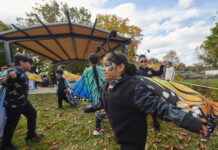Parents today realize that “the talk” is much more than it may have been for their generation.
In fact, it is not a single talk at all, but a series of lessons about consent that starts with boys and girls in preschool and continues through high school.
Many states, spurred by the cultural impact of #MeToo, adopted laws that require schools to teach consent. In New Jersey, consent is addressed in grades 6 through 12 and in Delaware, starting next fall, in grades 7 through 12. In April, PA State Senator Andy Dinniman introduced legislation to require consent education in the K-12 curriculum.
Since one in four girls and one in six boys will be sexually abused before they turn 18, it is best if parents talk to their kids about consent at home when they are young, but that’s often not the case.
“Parents often wait for their kids to bring the topic up, in the way that, if my child ever wants to talk about this, I’m here, open and available,” says Brendon Jobs, director of diversity and inclusion at the Haverford School.
It’s a well-intended plan, but if the right time never arises it is too easy to put off a conversation that neither parent nor child relishes.
“It’s about making intentional space and being brave enough to be proactive,” Jobs says. “It may even make your kids a little uncomfortable to get them to think about some of these issues.”
Because Hilary Platt has heard students say things like “She dresses like a slut, she deserved it,” and “My boyfriend hits me, but it’s okay,” she knows about the need to teach consent.
“These are really important statements, because if one person is saying it, more people are thinking it,” says Platt, coordinator and case manage for Project SARAH (Stop Abusive Relationships at Home) through Jewish Family and Children’s Services of Southern New Jersey.
Consent is more than sexual
"You should start to talk about consent very early with kids, even as toddlers," says Meghan Walls, pediatric psychologist at Nemours A.I. duPont Hospital.
“There’s a lot more to consent than just sexual consent,” she says. With preschoolers you can point out that this is your own body, this is your space and people can’t touch you without asking.
“I encourage parents to talk to kids at a young age about boundaries,” she says.
Parents can say things like “If you don’t want to be hugged by another kid you can say ‘This is my space and I don’t want you in my space,’” Walls says. “Or, ‘What are the things we need to ask permission for before we go up to another person — if I can hug them, if I can touch them, even if I can share their belongings.’”
Walls encourages parents to role play what it sounds like when someone wants you to hug them or share something. Is the answer an enthusiastic “yes” or does the child turn his back, mumble “no” or appear uncomfortable? “Even if you are ‘bothering’ the child you say no to, that is your right. Your body and your space and things like physical hugs are okay to say no to.”
One critical change in the conversation is that the prevailing rule of sexual consent – No Means No — is shifting to Yes Means Yes, which protects someone incapacitated or even too shy to say no. When someone says yes, it’s clear they are giving consent.
Parents should teach their children that only a verbal affirmative answer means yes, and anything else means they should either ask again if they aren’t sure, or take it as a no, says Walls.
“Parents can role play how to talk about their feelings, such as, ‘I felt sad that Katie didn’t want to hug me,’ but not have to act on those feelings,” she adds. “When we start these conversations early, we set the pathways to a better understanding of boundaries.”
Walls says research shows that talking about sex education as early as elementary school doesn’t do any harm. “It doesn’t make kids more promiscuous, but it does get rid of the mythology and excitement around the unknown, by parents having that conversation.”
A dad’s advice
Jason Z., 40, from Wilmington, agrees. When his sons Westen, 10, and Isaac, 8, were toddlers, he talked about consent but didn’t use that word. “I tried to teach them not just don’t hit or bite, but a lesson about not to violate someone’s personal space,” he says. “I talked about self-ownership and how it feels to be hurt or how it feels when someone touches you and you didn’t agree to it. Golden rule stuff.”
Those lessons are confirmed in their Brazilian jujitsu classes, which include a non-verbal part of training when they must do a two-touch system to verify that each partner is ready to engage. “They understand their bodies are capable of harm and using that capability in a responsible way is very important,” he says.
The boys learned how those lessons applied in romantic ways when their dad began dating after his wife passed away.
“It was a woman the boys already knew and they saw our physical relationship change,” he says. “They had seen me and their mom kiss and hug but we never explained that it was part of a deeper agreement and promise we had made to each other. So it opened up an opportunity for me to talk to them more specifically about romantic consent.”
Learn from mistakes
Eva (not her real name), 18, from Mount Laurel, NJ, hopes tweens and teens will learn from the mistakes she made when, during the summer between 7th and 8th grade, friends coerced her to sext.
“Middle school was when we started to see more pressure from children,” recalls her mom, who believes kids lose sight of the dangers in a quest to be popular. She noticed behavioral changes in her daughter and sensed that something wasn’t right. She looked in her phone and discovered compromising photos.
“Some teens think it’s the norm and don’t realize there’s anything wrong with it,” she adds. “Sexting is violating their boundaries and another form of abuse.”
After finding the pictures, Eva and her mom talked about the do’s and don’t’s of sexting and how it’s illegal. Eva went into counseling to begin the healing process.
Her mom has already started conversations with her 3-year-old son about consent, but in language he can understand. “We use words such as ‘my body,’ ‘my space,’ and ‘no touch,’” she says. “Just knowing that it’s his personal body is huge.”
A lot has changed in the 15-year gap between her kids. When her daughter was little and a relative would ask for a hug, she encouraged her to hug the person. Now, when she finds her son in a similar situation, she lets him decide if he wants to hug the person or not.
“We have to have these conversations with our children about their bodies and boundaries and caring for themselves, regardless of their gender or sexual orientation,” she says. “My daughter is still healing from that experience. She has come very far and is helping her fellow teenage friends with this topic.”
Terri Akman is a contributing writer to MetroKids.






